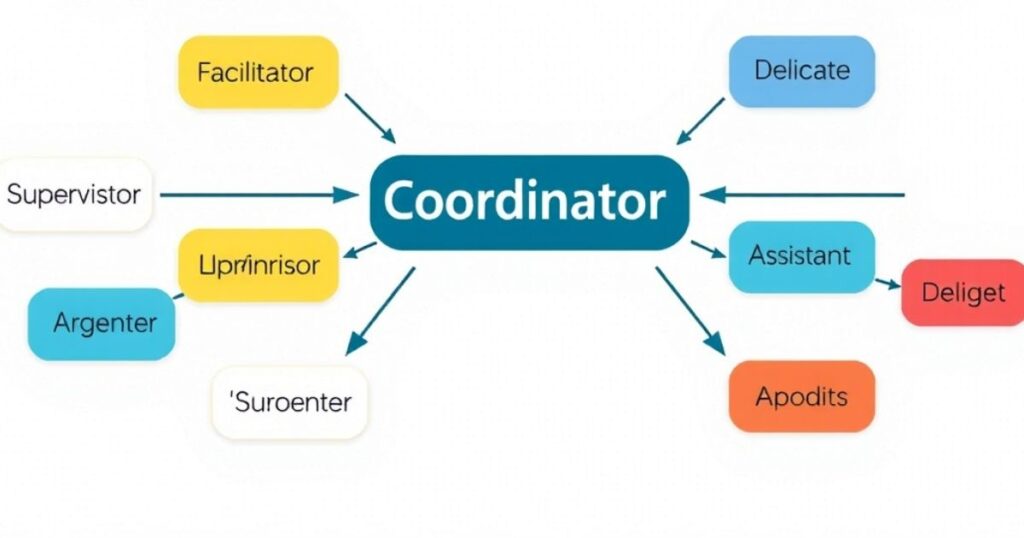The abbreviation for Coordinator is a simple and useful tool in many professional settings. The coordinator short form helps save time and space, especially in busy environments like project management or event planning. Instead of saying “Coordinator” every time, you can use the abbreviation for coordination, which is COORD. This coordination abbreviation is widely recognized and understood in many industries.
Using the abbreviation for Coordinator makes communication quicker and more efficient. Whether in emails, reports, or meetings, the COORD short form helps everyone understand the role without using long words. It’s a great way to keep things clear and concise. This small change in language can improve the flow of work and save valuable time. In this article, we’ll explore how to use the abbreviation for Coordinator, its importance, and examples of how it’s used in different situations.
What is the Abbreviation for Coordinator?
Abbreviation for Tetanus Shot: Definition & Meaning
The most commonly accepted abbreviation for “Coordinator” is COORD. This short form is especially useful in industries where time and efficiency are critical, such as in project management, event planning, and education.
Using COORD simplifies communication, especially in fast-paced work environments where brevity is essential. This abbreviation allows professionals to convey their message quickly without sacrificing clarity. In settings where numerous roles and tasks are being handled, using abbreviations like COORD helps keep things streamlined and organized.
What Does the Abbreviation for Coordinator Mean?

A coordinator plays a vital role in many different professional settings, from businesses to educational institutions. They are responsible for organizing and managing resources, schedules, and ensuring that everyone is aligned with the goals of the project or event.
The role of a coordinator is crucial because they ensure all aspects of a project run smoothly by facilitating communication, managing tasks, and making sure deadlines are met. Understanding the importance of a coordinator helps highlight how critical good coordination is in any organization or team.
Definition, Pronunciation, and Examples
Definition:
A Coordinator is someone who organizes and manages activities or tasks to make sure things run smoothly. They help plan, schedule, and communicate with the team to ensure everyone is working together toward the same goal. For example, a Project Coordinator oversees the progress of a project, making sure everything is done on time and within budget.
Pronunciation:
The word Coordinator is pronounced as “koh-OR-din-ay-tor”. The abbreviation COORD is pronounced like “kord.” This shorter form makes it quicker to say and easier to use in casual or quick conversations.
Examples:
- A COORD in an office might schedule meetings, send reminders, and make sure everyone has what they need to do their work.
- An Event COORD organizes events by finding venues, booking speakers, and making sure everything is set up on time.
- A Project COORD in a company manages the tasks for different team members, ensuring that the project is completed efficiently.
- An Academic COORD in a school or university helps with the planning of courses, schedules, and student activities.
Why Use the Abbreviation for COORD?
Saves Time:
Using the abbreviation COORD instead of writing or saying Coordinator every time helps save time, especially in busy work environments. This is important in fields like project management, event planning, or even education, where quick communication is essential.
Efficiency in Communication:
When a team is large or when there are many tasks to discuss, using COORD makes communication simpler. Instead of saying the full word “Coordinator,” you can say COORD, which keeps things clear and concise. In emails, reports, or meetings, this abbreviation can help everyone focus on the message without extra words.
Familiarity and Convenience:
In many professional settings, people already understand what COORD means. This makes it easier for everyone to stay on the same page. The abbreviation becomes a shortcut everyone recognizes, and using it makes the conversation flow more naturally.
Keeps Work Organized:
When you use COORD instead of writing out Coordinator, it helps keep documents, schedules, and notes organized. It prevents unnecessary repetition and ensures that everyone knows exactly what role is being discussed without confusion. For example, instead of writing “The Project Coordinator will manage the tasks,” you could write “The COORD will manage the tasks,” which is shorter and just as clear.
Related Guide:
35 Synonyms & Antonyms for Luddite
Real Life Example: The Role of a Coordinator
In a busy office, the Project Coordinator has an important job. Their main responsibility is to make sure that everyone on the team knows what they need to do and when to do it. For example, let’s say the company is planning a big event. The Project Coordinator will organize meetings, create schedules, and make sure that the right people are in the right place at the right time.
Imagine a school where a Coordinator helps organize school events like field trips or concerts. The Academic Coordinator works with teachers, students, and parents to plan everything carefully. They send out reminders, book buses or venues, and ensure that all details are covered, so the event runs smoothly without any problems.
In a hospital, a Coordinator can help manage the day-to-day activities of doctors, nurses, and other staff. For example, they might schedule patient appointments, make sure the right medical supplies are available, and communicate with patients to confirm their appointments. This keeps everything organized, so the hospital works efficiently, and patients get the care they need on time.
A Coordinator can also work in a community center, organizing activities for children or adults. They help plan events like after-school programs or fitness classes. They make sure that everything is ready for each event, whether it’s setting up equipment, arranging materials, or coordinating with other staff members. This makes the community center a well-organized place where everyone can enjoy the activities.
In all these examples, the Coordinator is the person who keeps everything organized, ensuring tasks are done on time and everyone knows what to do. This helps save time, reduces confusion, and makes sure everything runs smoothly.
When and How to Use the Abbreviation for COORD

You should use the abbreviation COORD when you want to save time and space in communication, especially in emails, reports, or meetings. It’s useful in professional settings like project management, event planning, or education. For example, instead of saying “Project Coordinator,” you can say “COORD” to make your message quicker and more efficient. Just make sure the people you’re talking to understand the abbreviation. It’s best used when you need to be clear and concise.
When to Use COORD:
You can use the abbreviation COORD when you need to quickly refer to a Coordinator in a professional setting. This is especially helpful when you are sending emails, writing reports, or talking to a team. It saves time and makes communication quicker. For example, instead of saying “The Project Coordinator will manage the tasks,” you can say “The COORD will manage the tasks.”
In Meetings:
In meetings, when discussing different roles, you can use COORD to save time. For example, you might say, “The COORD will make sure the schedule is set up.” This helps everyone understand the role without saying the full word “Coordinator” each time.
In Emails and Messages:
When writing emails or messages, COORD is a good abbreviation to use. If you are talking to a team or client, it is faster to type COORD than to type Coordinator every time. For example, “Please send the reports to the COORD by Friday.”
When Space is Limited:
In places where space is limited, such as forms, labels, or charts, using COORD helps you save space. For instance, if you are filling out a contact list, it’s easier to write “COORD” instead of “Project Coordinator” or “Event Coordinator.” This keeps everything neat and clear without taking up too much room.
How to Use COORD:
When using COORD, just make sure the people you are communicating with understand the meaning of the abbreviation. In most professional settings, people know that COORD stands for Coordinator. Always try to use it in a way that makes your message clear and simple, like in “The COORD will handle the team meeting details.” This way, everyone will know what you mean without needing extra explanation.
Short Abbreviation for Coordinator
The short abbreviation for Coordinator is COORD. This is a simpler and quicker way to refer to a Coordinator in many professional settings. It’s especially helpful when you want to save time or space in writing or speaking. For example, instead of saying “Event Coordinator” or “Project Coordinator,” you can just say “COORD” to make communication faster and easier. It’s commonly used in emails, reports, and meetings where everyone understands what it means.
Acronym for Coordinator
An acronym for Coordinator is COORD. An acronym is a shorter form of a word or phrase made by using the first letters of each word. In this case, COORD comes from the word Coordinator. It’s often used in professional settings to make communication quicker and easier. For example, instead of writing “Project Coordinator” or “Event Coordinator,” you can simply write “COORD.”
How to Pronounce the Abbreviation for Coordinator
The abbreviation COORD is pronounced like “kord.” It sounds very similar to the word “cord.” The COORD abbreviation is simple to say and makes talking about coordinators faster, especially in busy or time-sensitive environments.
Other Examples
- Mgr – Short for Manager. This abbreviation is used to refer to someone in charge of a team or department.
- CEO – Stands for Chief Executive Officer, the highest-ranking person in a company.
- Admin – Short for Administrator, used to refer to a person who manages operations in an office or organization.
- Ass’t – An abbreviation for Assistant, used to describe someone who helps with tasks or supports another person in their role.
These abbreviations help save time and make communication easier in many settings, just like COORD for Coordinator.
Synonyms and Antonyms of Coordinator

Synonyms for Coordinator include Manager, Organizer, Facilitator, and Administrator, as they all refer to someone who helps organize or manage tasks. Antonyms include Follower, Employee, and Disorganizer, which refer to those who do not take charge of coordinating activities. These words highlight different roles that either involve leading and organizing or following instructions.
Synonyms:
Synonyms are words that have the same or similar meanings. Some synonyms for Coordinator include:
- Manager – A person who is in charge of managing activities or tasks.
- Organizer – Someone who arranges or plans events or activities.
- Facilitator – A person who helps make things easier by guiding or assisting others.
- Administrator – A person responsible for managing and organizing a company or team.
- Supervisor – Someone who oversees the work of others.
Antonyms:
Antonyms are words that have opposite meanings. Some antonyms for Coordinator include:
- Follower – A person who follows orders or instructions, rather than organizing or leading.
- Employee – A person who works for someone else, typically without being in charge of coordinating tasks.
- Disorganizer – A person who makes things chaotic or doesn’t organize well (this is not a common term but could be used in a negative sense).
Examples in Different Contexts
- In a Business Setting: The Coordinator in a company ensures that all departments work together to meet project deadlines. The Manager might rely on the Coordinator to arrange meetings and manage schedules.
- In Event Planning: A Coordinator at a wedding plans everything, from booking the venue to arranging food and decorations. The Organizer makes sure all guests are informed about the schedule and location.
- In Education: An Academic Coordinator in a school ensures that the class schedule is set and that teachers have all the resources they need. The Supervisor in a school might oversee the performance of teachers and ensure everything runs smoothly.
- In a Hospital: A Coordinator in a hospital might be responsible for scheduling patient appointments and making sure all the necessary medical staff are available. The Administrator manages the overall hospital operations, while the Coordinator focuses on specific tasks.
The History of the Word Abbreviation for Coordinator
The word Coordinator comes from the Latin word “coordinare,” which means to arrange or organize. It is made up of two parts: “co-” meaning together, and “ordinare,” meaning to arrange or order. Over time, this word was used to describe someone who organizes activities or tasks, making sure everything runs smoothly.
The abbreviation COORD is a shorter version of abbreviation for Coordinator, which makes it quicker to say and write. This abbreviation started being used more widely in workplaces and organizations where time is important, such as in project management, event planning, and business settings.
As the need for fast communication grew, especially in emails and meetings, people began using COORD instead of the full word Coordinator. The abbreviation made it easier to keep things short and simple, especially in fast-paced environments.
Now, COORD is commonly understood in many industries and is often used to save time and keep things efficient.
FAQs
What is COORD short for?
COORD is the abbreviation for Coordinator. It’s commonly used in professional settings to simplify communication and make it more efficient.
What is the shortcut for coordinator?
The abbreviation for Coordinator is COORD. This short form is used in many fields to save time and streamline communication in fast-paced work environments.
What is the abbreviation for coordinating?
The abbreviation for Coordinator coordinating can vary, but often people use COORD, which stands for Coordinator. It’s widely recognized in project management and event planning.
What is the abbreviation for project coordinator?
The abbreviation for Coordinator Project Coordinator is COORD. It helps save space and makes communication quicker in emails and reports related to project management.
What is the abbreviation for coordinator in emails?
In emails, the abbreviation for Coordinator is COORD. It’s commonly used to simplify communication while keeping the message clear and efficient in professional contexts.
Conclusion
The abbreviation for Coordinator is an essential tool for improving communication in many professional settings. The coordinator short form, COORD, is widely used in industries like project management, event planning, and education. By using the abbreviation for Coordinator teams can save time and keep communication simple and clear. It is especially helpful in fast-paced environments where efficiency is key. The coordination abbreviation helps professionals quickly identify roles and responsibilities without unnecessary repetition.
Whether in emails, meetings, or reports, the abbreviation for Coordinator makes it easier to communicate important information. It also helps reduce confusion and ensures everyone understands the role of the coordinator in managing tasks and schedules. Overall, the abbreviation for Coordinator is a small yet effective way to improve efficiency and clarity in the workplace. Using this short form ensures faster communication and helps keep teams organized. It’s a simple change that can make a significant difference in everyday work life.

Atlas Reid is an experienced administrator with 5 years of expertise in managing operations, streamlining processes, and ensuring efficiency. Skilled in leadership, organization, and problem-solving to drive business success.








